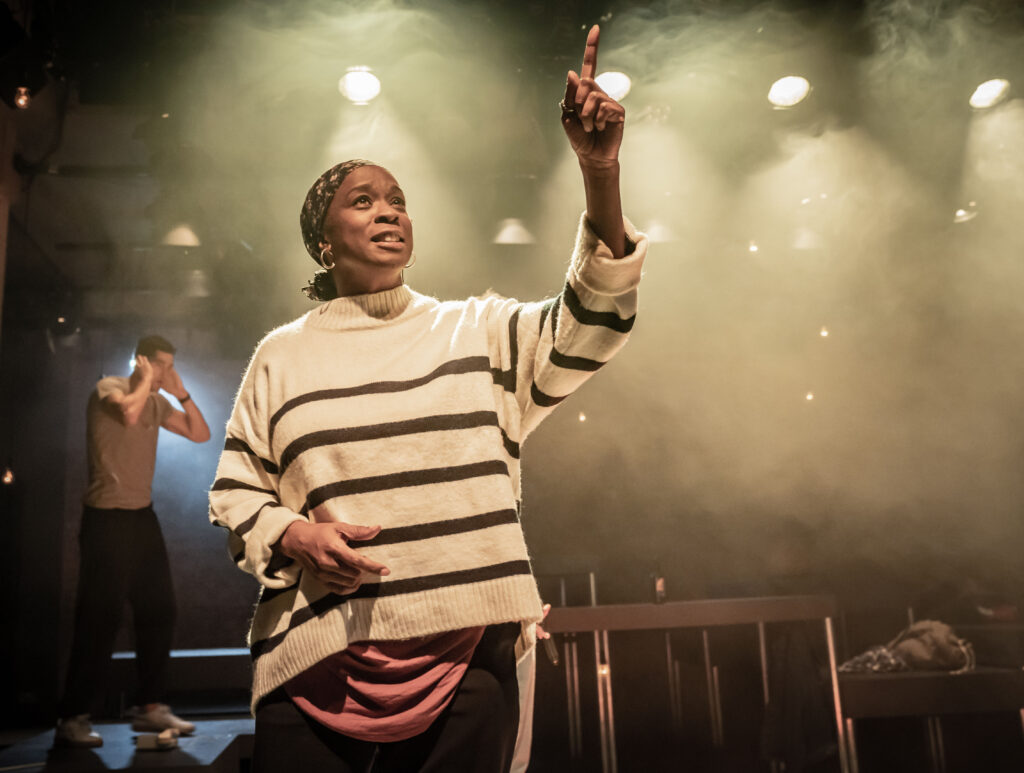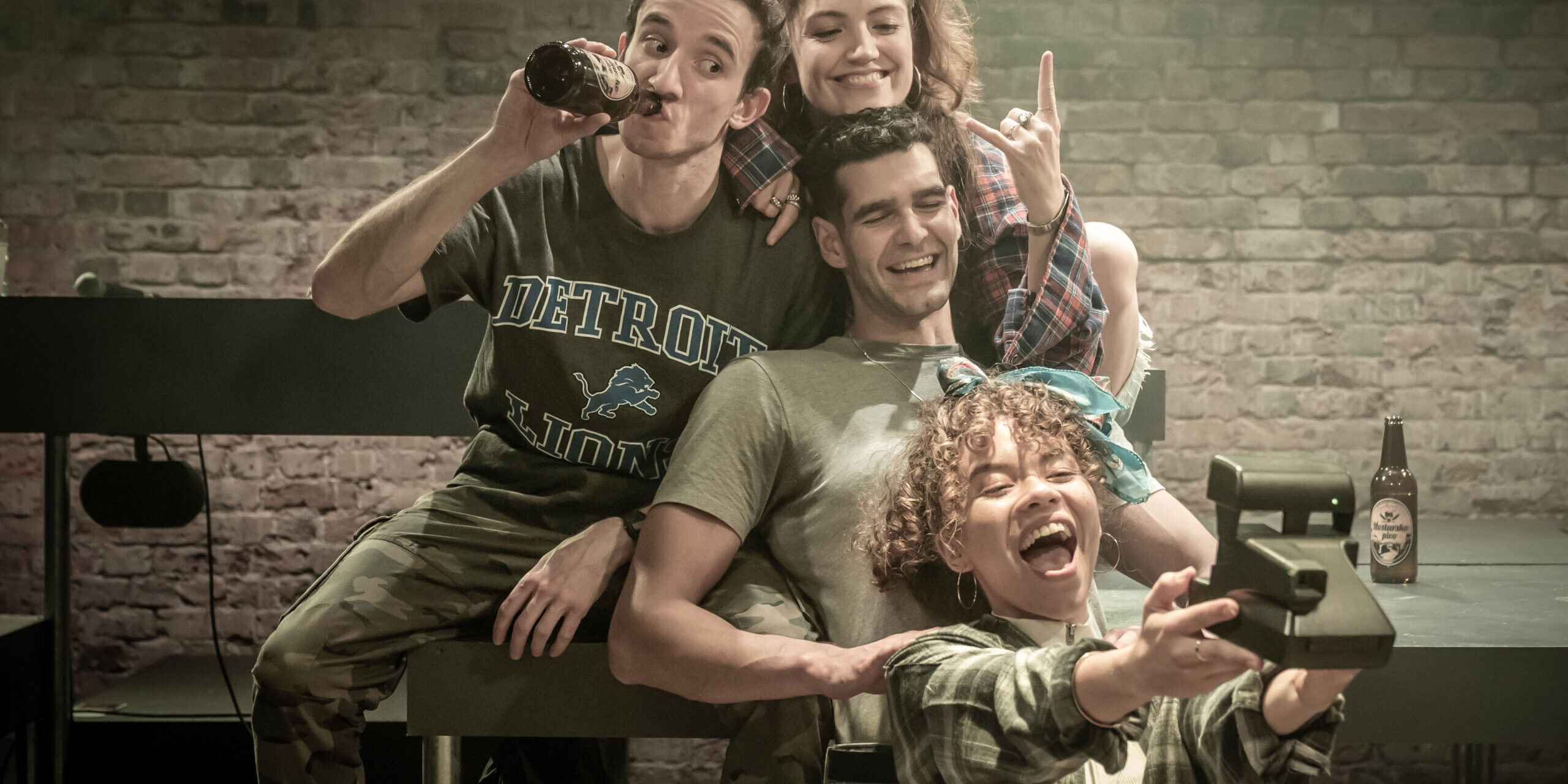Igor Memic’s play Old Bridge won the 2020 Papatango Prize. Miran Hadžić was lead producer on Out of the Woods: New Plays from the Balkans. The two British Bosnian playwrights discuss writing, identity, telling Bosnian stories in the UK and artistic responsibility.
Miran Hadžić: Igor, tell us a bit about Mostar and your background, and how you came to write Old Bridge (Memic’s play, set in his hometown of Mostar. about a group of young friends whose lives are upended by war, which played London’s Bush Theatre last year).
Igor Memic: Mostar is a beautiful city in the centre of Herzegovina. A crossroad between East and West where you’ll find Austro-Hungarian bathhouses, Ottoman mosques and 20th century spomeniks all on the same street. To me it’s just ‘home’, but every friend I’ve ever brought there has told me it’s like a fairy-tale. Old Bridge was a play that was always in me. These were the stories I grew up with and inherited, but for many years I promised myself that I would never write it – I wanted to be a ‘playwright’ not a ‘Bosnian playwright’. I guess after a while I just couldn’t hold those stories back any longer.
MH: So what does this make you now? Still just a playwright? Or a Bosnian playwright?
IM: I think Bosnia-Herzegovinian-Born Post-Yugoslav British Playwright would struggle to fit in the Twitter bio. I’m happy with whatever box I’m put in to be honest, just as long as no one starts shooting.
What about yourself?
MH: I see myself as a writer. But I understand the need for labels. And you can’t really escape it. My audio drama Fifth Dimension for the podcast series I produced Out of the Woods: New Plays from the Balkans definitely took its influence from events in Bosnia and the former Yugoslavia, but was about the UK today. So you’re always wrestling with these two identities.
Speaking of labels, I remember telling you about my surprise when I read the headline ‘British Bosnian Playwright Wins Papatango New Writing Award’; I thought, ‘hang on, did I submit a play to the Papatango Award?! Why haven’t they told me yet?!’ It was slightly trippy but a real joy to see that there was another British Bosnian playwright out there.
Old Bridge does that classic trick of a play (which actually feels like a very British theatre characteristic) of making you laugh in the first half and making you cry in the second half. Is humour a natural feature of your writing, or something you consciously crafted for this play?
IM: My mantra has always been don’t write funny lines, write funny characters. Bosnians are famed for their gallows humour and watching this connect on stage was so rewarding. And not just with the ex-Yugo community but with British people as well. Laughter amidst a tragedy is a survival mechanism as old as time, and you only have to look at the first lockdown to understand how deeply human this is: when people were dying every single day we took to zoom quizzes and Netflix watch parties to survive – anything we could to see the people we care about laughing. So long as you were laughing, the world wasn’t over yet.
MH: Some of the lines in Old Bridge, especially the jokes and insults, felt to me as though they were written in Bosnian and then translated into English. To the point where some struck me as not something an English person would say, but if they were translated into Bosnian would make perfect sense. ‘I only sign ass-cheeks I’m afraid, but if you’re happy to bend over?’ Or ‘When you make plans, God laughs’. Have I got this right? What was the intention behind this?
IM: My friends would very much describe me as a Bosnian translated into English, so that doesn’t surprise me at all. But no, everything was written in English other than a couple of expressions and aphorisms that I had to rework into something that would connect a little easier to the English zeitgeist. That being said there was one joke – ‘Burek with a knife and fork?!’ – which split the room evenly down the middle; every night you could spot exactly who was from that part of the world and who didn’t have a clue why the other half was laughing.
MH: So I was wrong! But that’s fascinating. It’s like your Bosnian and British identities were smashed together and out came this hybrid voice…
It feels like a more common trope now in English theatre to have characters ‘speaking’ another language by having them speak English in a slightly off-beat or irregular way. It’s something I’m looking at exploring further with a play I’m working on; how we grapple with language to help it define us. I’m lucky that my parents taught me to speak, read and write in Bosnian, which I think goes a long way to forming your diaspora identity. If you can speak it, you can feel it.
IM: You’re so right. Language is identity. When you come from a part of the world where wars have literally been fought over whether to spell coffee kafa, kava, or kahva then you can’t help but keep one eye on language at all times. That being said this play has always been, to me at least, about the universal. The things that unite us rather than separate us. I think it also comes down to personal taste and preference, and one of the first lines of stage direction in Old Bridge states that accents should reflect the place in which the play is being performed. When you’re watching someone on stage who sounds like you, your empathy bond increases. That’s why villains always have Eastern European accents – bad things can happen to them and you don’t have to feel bad about it.
MH: Ah yes, the old Eastern European villain accent… although it feels like Hollywood has started making English people the bad guys more recently. So that’s progress of a kind…
Old Bridge has lots of narration which some critics picked on as extraneous. I actually interpreted this as a stylistic, formal nod to the culture that the play was depicting – the story-telling culture of my Bosnian friends and family. That made me think about English culture, and what’s permissible as good story-telling craft. England has a vast literary and theatre culture, but not an oral story-telling tradition as far as I’m aware.
IM: I think British theatre criticism has a very low tolerance for formal experimentation. The margin for success is so narrow because if you’re gonna try something new you better get it perfect – trying alone will not be tolerated. Whereas on the continent these restraints are far less prevalent. That being said, the UK is the capital of the world for theatre so maybe they’re onto something. I think what was always more important to me was faithfully depicting the oral traditions I had been raised in, the very traditions that had passed these stories onto me, and staying true to what Old Bridge was always about: a woman trying desperately to come to terms with her past the only way so many people back home know how – by telling stories. And when they do, the characters and the worlds they conjure permeate through the walls around them like magic.

Dino Kelly and Susan Lawson-Reynolds in Old Bridge at the Bush Theatre, London. Photo: Marc Brenner
MH: It’s interesting to me how this oral story-telling tradition filters down into the way people behave and communicate. When two English people meet, the impulse seems to be to ask questions of the other person to find common ground. In my experience, Bosnians do the opposite – they tell you about themselves, where they’ve just come from, some hilarious thing they saw earlier – but they won’t ask many questions about you! Story-telling and narrating one’s life seems to be embedded in the way Bosnians communicate. I’ve often wondered whether this is truly characteristic of Bosnian culture, or is it something that all people from all cultures do, just in a variety of ways.
IM: So far there’s only two other places in the entire world that I’ve stepped into and felt an instant affinity between Mostar’s people and theirs: Chicago and Liverpool. It’s that heart of gold hidden under a tough exterior. They’ll lay out all the food in their home for you, even if it was meant to last them a week. Laughter and good times are valued above all else. You’ll meet as strangers in a pub, become best friends by the final round, and leave knowing without a doubt that they would take a bullet for you… just don’t ever… ever get on the wrong side of them!
People like this are rare to find, and hard to lose. And if this is the world you’ve grown up in, how could you not be moved to write stories about them.
MH: You describe my experience of Sarajevo perfectly. Another thing that I felt Old Bridge did quite skilfully was avoid overtly laying the blame anywhere. In one sense the play is super-specific; the kafa, the burek, the Toni Kukoč Chicago Bulls jersey, the jumping from stari most. All these elements were particular to the world you were depicting. But on the other hand the play could have been set in any other country that has experienced these social upheavals, about any group of young people. How did you find this balance?
IM: I never wanted Old Bridge to be a history play. It’s a play about two teenagers falling in love at the wrong time. All of us, to a certain extent, feel as though we live at the end of history. That the days of world-changing events are behind us. Then just at the moment you feel comfortable, everything turns on its head. There’s that gorgeous line in The Plague by Albert Camus where he says ‘There have been as many plagues in the world as there have been wars, yet plagues and wars always find people equally unprepared.’ I think that’s as true for the kids in Old Bridge as it was for all of us two years ago. It was always meant to be a story about a specific event in a specific place in the world, but one that could’ve happened anywhere.
MH: Indeed. It’s why I keep coming back to the war in Bosnia. It’s a lesson for everything that is going on today. But one of the things I feel when writing the stories of my Bosnian heritage is a responsibility towards this very recent history. If I am going to write about the siege of Sarajevo, for example – which my family fled a few months into, when I was two years old – then that comes with responsibility and weight. Especially if I was lucky enough to escape it. And especially if I am also going to ask those same people to eventually pay for a ticket and give up their evening to come and see it. Y’know? It’s like, don’t fuck this up – there’s a lot of real-life emotion at stake. But I never want this to hold me back because the stories need telling because they are so rich, so filled with raw human emotion, so compelling, and relevant to today’s world. I guess it’s about finding a balance that feels authentic. Did you feel this responsibility when writing about Mostar?
IM: I can’t tell you how much I was inhibited by my survivor’s guilt. I felt those ghosts over my shoulder watching me type ever single word and judging me for using their stories… The only thing that really freed me was, I guess, wondering how I would feel if it were the other way around. If it was me with a bullet in the head, watching some kid writing Old Bridge. Would I want him to tell my story? Absolutely.
I’ll never forget a woman who I’d never met before, coming up to me in tears after the play, taking my hand in hers and saying ‘thank you for telling this story.’ Watching survivors leave the play feeling seen after being silent for so long. Invisible for years… That sense of communal healing, it pushed my understanding of what theatre could do.
MH: That’s beautiful. What an experience. It’s what I really admire about you writing this play – the fact that you just went for it, despite those ghosts looming over your shoulder.
Main image: Emilio Iannucci, Rosie Gray, Dino Kelly and Saffron Coomber in Old Bridge at the Bush Theatre, London.
Further reading: The Guardian on Igor Memic’s Old Bridge
Kosovo 2.0 on Into the Woods: New Plays from the Balkans









